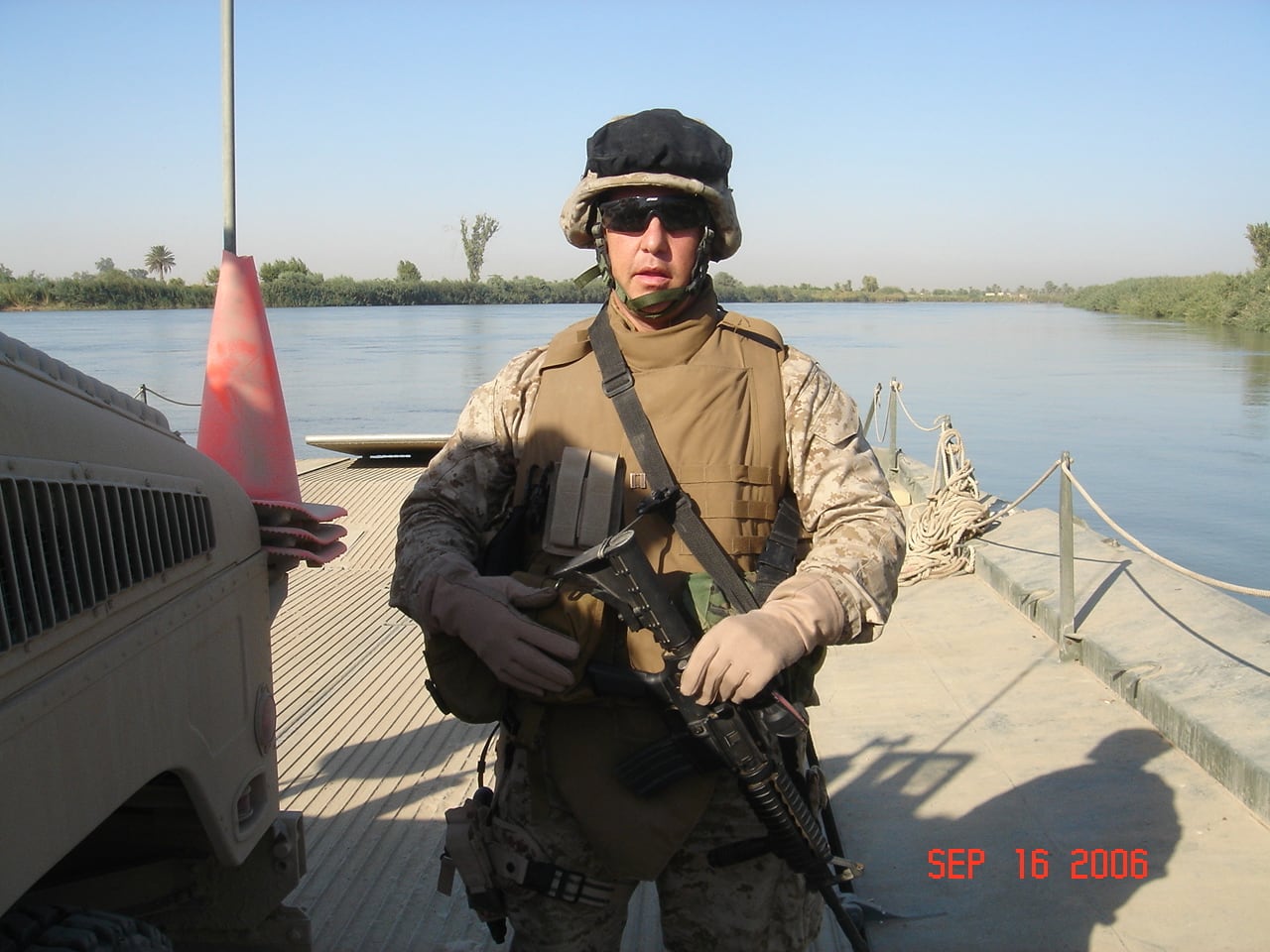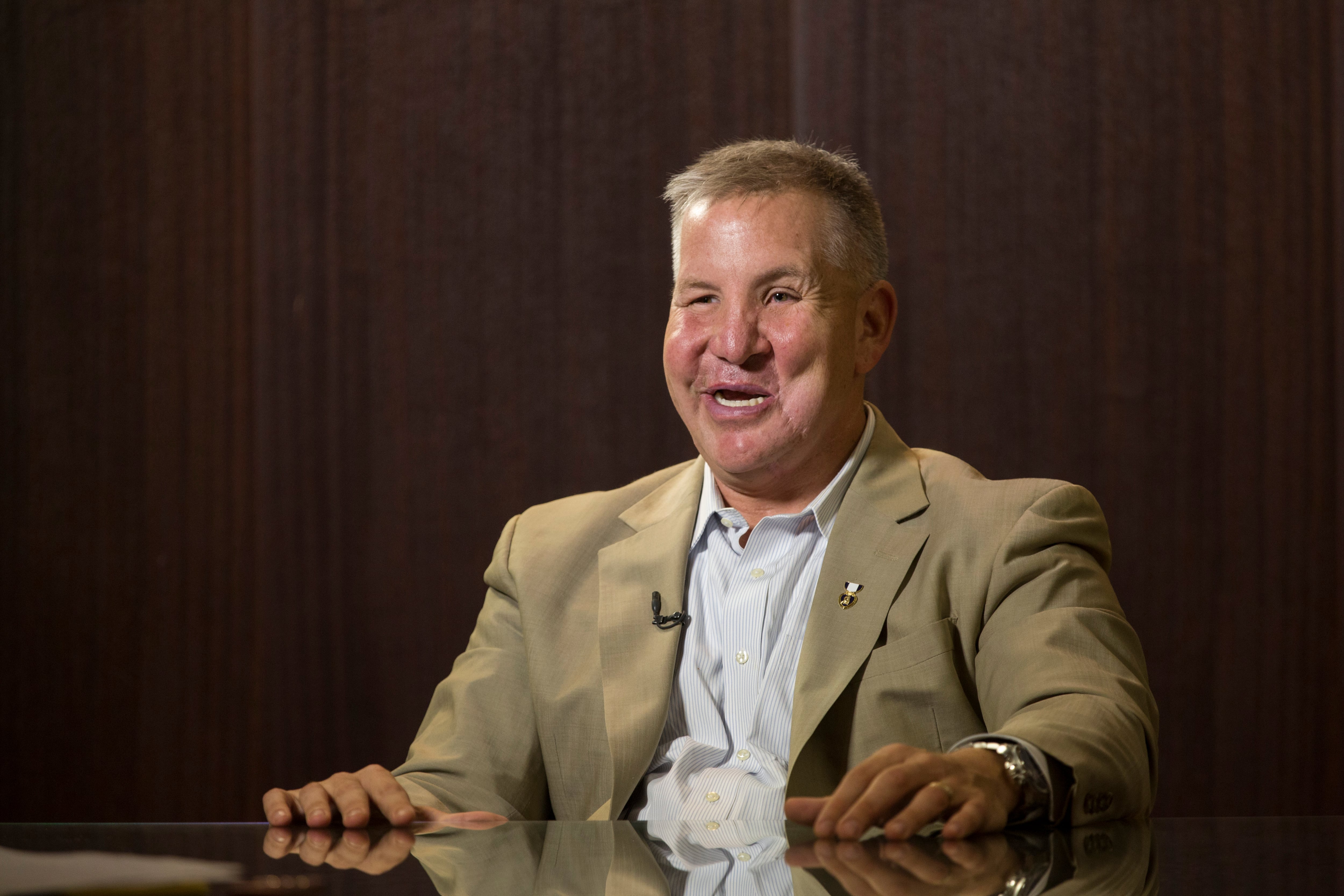Justin Constantine defied the odds when he made it home from Iraq.
A lawyer by trade, then-Maj. Constantine deployed to al Anbar province in 2006 with a small Marine civil affairs team. The team was attached to 3rd Battalion, 2nd Marines, and worked to rebuild infrastructure in a volatile area between Ramadi and Fallujah that had proved perilous to Marines.
"When I got there, I checked in with the battalion commander and on the wall outside his office he had pictures of all the young Marines who had already been killed by IEDs and some snipers," Constantine, who retired at the rank of lieutenant colonel, told Military Times. "It was heartbreaking because it looked like a high school yearbook — mostly lance corporals and corporals."
On Oct. 18, 2006 — just six weeks into the deployment — Constantine was were patrolling in an area where there was a known enemy sniper. Constantine, the team leader, had just urged a journalist embedded with the team to keep moving so they didn't end up in a sniper's sights. As the reporter took a step forward, a round flew through threw the space where his head just was and hit a wall.
Before Constantine could react, a second shot hit behind his ear and exploded out his mouth.
"The Marines thought I had been killed," he said.
He credits the Marines and corpsman in the field with saving his life. They put him back in a vehicle and drove 70 mph though terrain laden with improvised explosive devices to get him to an aid station, where they operated on him. Within days he was moved to Germany and from there to the Walter Reed National Military Medical Center in Bethesda, Maryland.
He's had about two dozen surgeries to reconstruct his face, including one that lasted close to a day long. His head swelled to the size of a basketball and he wouldn't go out in public for months. He went to counseling for post-traumatic stress for more than a year until he said his "dark days" came less and less.
Now, after celebrating his ninth annual "alive day," Constantine, a motivational speaker who recently gave a TED Talk, is on a new mission. A , amotivational speaker, hHe wants to get Americans thinking about how they talk to wounded warriors with physical and invisible wounds.
Q. You are recommending that people approaching wounded vets remember five things. Tell us about that.
A. The first rule is don't pity us. Treat us like everyone else. No veteran wants pity — we are moving on with our lives and we've already overcome great adversity.

Then-Maj. Constantine, a judge advocate during his 2006 deployment to Iraq, now serves on the boards of Wounded Warrior Project, Give An Hour and SemperMax.
Photo Credit: Courtesy of Justine Constantine
The second is don't ask us about post-traumatic stress. We wouldn't ask anyone else in society about an issue like that, so veterans shouldn't have to answer that question.
The third is don't make grandiose promises. When I was in the hospital, I'd come home with a big stack of business cards because a whole bunch of important people came through to shake my hand. Once we're back on our feet, though, and start calling people who promised help, things don't always materialize.
The fourth is don't treat us like we're helpless. A lot of us are surviving injuries that would have killed us in previous wars, but we have support systems that weren't in place back then. So you don't need to feel sorry for us.
The last is don't forget to include our caregivers. It's almost insulting to the caregivers to not include them when they're so important and a critical part of everything we do.
Q. What were some of your own experiences that led to you wanting to do this?
A. I have seen a whole spectrum. Today, it's a lot different than how people responded nine years ago. When I first left the hospital, I didn’t have any of my lower teeth so I drooled like crazy. My head was swollen. I rarely left the house … that often because people would just stare, clearly wondering what happened. That actually inspired me to make a T-shirt that with said in big letters "Iraq and back."
People were clearly uncomfortable looking me in the face because it was so disfigured, which made me feel worse. Over time, it has gotten better. I've had a lot of reconstructive surgery and I pronounce my words better. When people find out I'm a wounded warrior, I can tell they have some questions. I thought I couldn't be the only one going through this.
Q. What are you hearing from other vets about their interactions?
A. We talked about challenges we face or what's going right, what's going wrong. I think a number of veterans are concerned about the issue of post-traumatic stress. While most people around the country have been fantastic and welcoming, there have been some negative reactions. We don't want to be the "PTS generation."
We don't really talk about mental health in this country, so when we talk about PTS, framed as something that has gone wrong with a veteran. We don't ever say, "Here's Justin — he went to counseling for a year and a half but he works out because a healthy body is good for a healthy mind, and he's doing peer mentoring, and he's doing all these right things like thousands of other vets. This is a great success story." Instead, what makes the news is when someone does something wrong, and that bothers a lot of veterans.
Q. What's the takeaway you want people to better understand about today's generation of veterans?
A. They should treat us like they would anyone else. I went through something tough, just like millions and millions of other Americans have through car accidents, natural disasters, rape or violent assault. We're just a sliver of society who are facing the same challenges. I wish that more people recognized that.
Q. Is there anything vets can do on their end to make these interactions go more smoothly?
A. I think it's a two-way street. For example, when we talk to vets about employment, we stress that it's incumbent on them to write résumés that civilian employers can understand. It's incumbent on them to rehearse for their interviews and make sure they're as prepared as possible.
I think if veterans have an issue, they should put pen to paper and write an op-ed. If there's something that bothers them about the VA for instance, don't just gripe about it to other vets. Raise the issue. Let the rest of the country know about it because most Americans, regardless of political affiliation, support us. There is no reason in this day and age for anyone to sit home on the couch suffering when help is just a conversation away.
Retired Marine Lt. Col. Justin Constantine recalls the day he survived being shot in the head by an Iraqi sniper:









